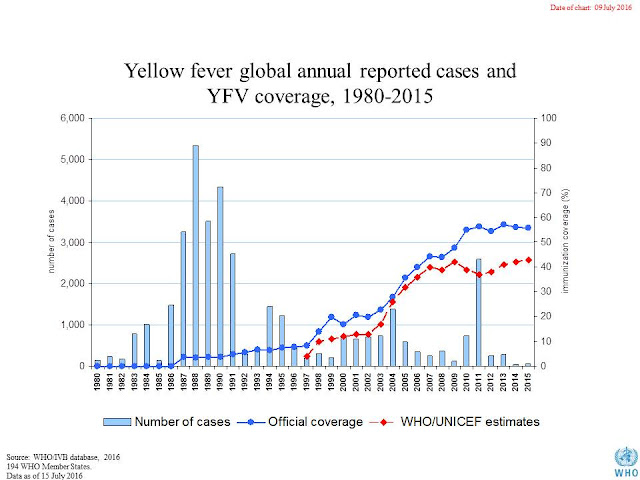But why was it overhyped: Probably because of the Olympics (might affect affluent visitors) or because a baby with a small head makes good headlines. And of course, unlike Dengue, which is much more common and deadly, Zika can be used to push contraception and change abortion laws.
but traditionally, Yellow Fever is the real danger, and after a decade of quiet, is is coming back:
As I have noted in previous blogposts, the Yellow Fever epidemic in Angola has spread to the Congo, and a few Chinese nationals who returned home were diagnosed with it in China (in an area where it could have spead, but didn't, thanks to China being a more modern country).
WHO MAP:April 2016:
I should note that Uganda had some cases, but they were not related to the Angola outbreak.
those cases were "Endemic", i.e. sort of smouldering along, usually in animals in isolated areas.
and now the headlines: NYTimes reports of an outbreak in Southern Brazil: and like the Uganda outbreak, it was from an "endemic" source, not from a traveler.
A spokeswoman for the Minas Gerais State Health Secretariat said all the cases reported so far were sylvatic, meaning that the infection has been passed by mosquitoes in the wild, in rural areas where monkeys are known to carry the disease.
Small outbreaks are occasionally set off in rural towns when loggers, miners or other forest workers catch the disease and transmit it to local mosquitoes. Those outbreaks may die out spontaneously with the arrival of cold or windy weather, or they may be quelled by vaccination campaigns.
But if yellow fever reaches cities infested with Aedes aegypti mosquitoes — the same species that carries the Zika virus — it can set off outbreaks that spread so fast that vaccination teams and mosquito-control teams cannot contain them.
The disease has a reservoir in local monkeys, so is hard to eliminate. NYT reports Brazil is going around vaccinating people with the vaccine to stop the disease from spreading.
WIKIPEDIA ARTICLE>
Yellow fever causes 200,000 infections and 30,000 deaths every year,[3] with nearly 90% of these occurring in Africa.[5] Nearly a billion people live in an area of the world where the disease is common.[3] It is common in tropical areas of South America and Africa, but not in Asia.[3][7] Since the 1980s, the number of cases of yellow fever has been increasing.[3][8]This is believed to be due to fewer people being immune, more people living in cities, people moving frequently, and changing climate.[3]
changing climate?
No, lack of public health interventions: Spraying for mosquitoes, using insect repellent, draining the swamp/ ditches/puddles, and giving people immunizations, and quarantine if needed. Or as the NYT notes:
“The question is why people weren’t vaccinated in these areas,” Dr. Alves said. “Minas Gerais has long been known as a risk area for yellow fever. That is what most calls my attention.”
As for climate change: Was that why Philadelphia had a yellow fever epidemic in 1793? LINK. It was brought in by travelers
The word "quarantine" refers to ports trying to stop the importation of disease, especially the black plague, by keeping them outside for 40 days until the disease is apparent or has killed everyone on the ship. Of course, a small "gift" could get you or your goods into port, so it didn't work very well... If you watch Outlander, there is a scene where Claire diagnoses smallpox and stop the offloading of a ship by a VIP who was skirting the law.
in a link to my medical blog, I discussed the IHS, but that is an offshoot of the PHS, the US Public health service. which was founded to treat sailors, and later tasked to provide health care on reservations. The hospitals for sailors were closed by Jimmy Carter, but the commissioned Corps still work in the IHS and other areas.


No comments:
Post a Comment